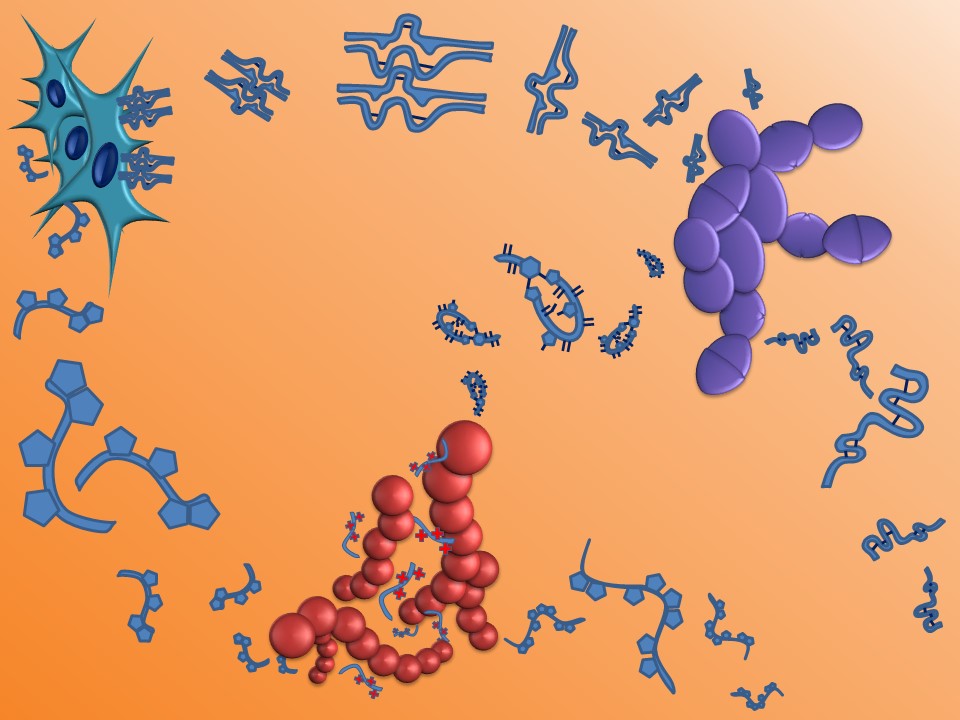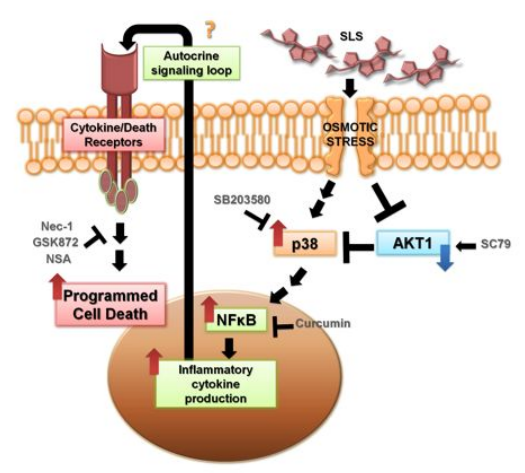Research Interests
 The current research goal of our laboratory is to understand the mechanisms behind bacteriocin production and its role in influencing microbial dynamics. Bacteriocins are a large class of ribosomally synthesized peptides produced by bacteria that encompass an enormous range of structure and function. Although bacteriocins have been historically investigated for their potential antimicrobial activities, recent efforts in genomics and natural product discovery have led to a tremendous ‘explosion’ in the sheer number and diversity of bacteriocins from the prokaryotic domain. It has been estimated that all bacteria and Archaea produce at least one, if not multiple bacteriocin-like peptides, that have diverse activities ranging from antimicrobial, anti-viral, anti-parasitic compounds, to host virulence factors, to bacterial signaling molecules that mediate polymicrobial dynamics and multicellular behaviors such as biofilm formation.
The current research goal of our laboratory is to understand the mechanisms behind bacteriocin production and its role in influencing microbial dynamics. Bacteriocins are a large class of ribosomally synthesized peptides produced by bacteria that encompass an enormous range of structure and function. Although bacteriocins have been historically investigated for their potential antimicrobial activities, recent efforts in genomics and natural product discovery have led to a tremendous ‘explosion’ in the sheer number and diversity of bacteriocins from the prokaryotic domain. It has been estimated that all bacteria and Archaea produce at least one, if not multiple bacteriocin-like peptides, that have diverse activities ranging from antimicrobial, anti-viral, anti-parasitic compounds, to host virulence factors, to bacterial signaling molecules that mediate polymicrobial dynamics and multicellular behaviors such as biofilm formation.
 A primary focus in our lab is to gain a better understanding of the role of bacteriocin-like cytotoxins produced by bacterial pathogens in influencing host disease. As a model, we focus on the ribosomally produced peptide toxin, Streptolysin S, produced by the Gram-positive human pathogen, Group A Streptococcus. Although historically investigated as a powerful cytolysin, recent findings have indicated that Streptolysin S and related toxins may also alter host cell processes at various points during the infection process. Insights into how the Streptolysin S alters host immunity will guide the development of novel therapeutics, as well as vaccine strategies for treatment and prevention of diseases caused by Group A Streptococcus, as this pathogen is responsible for an estimated 18 millions cases of severe disease each year.
A primary focus in our lab is to gain a better understanding of the role of bacteriocin-like cytotoxins produced by bacterial pathogens in influencing host disease. As a model, we focus on the ribosomally produced peptide toxin, Streptolysin S, produced by the Gram-positive human pathogen, Group A Streptococcus. Although historically investigated as a powerful cytolysin, recent findings have indicated that Streptolysin S and related toxins may also alter host cell processes at various points during the infection process. Insights into how the Streptolysin S alters host immunity will guide the development of novel therapeutics, as well as vaccine strategies for treatment and prevention of diseases caused by Group A Streptococcus, as this pathogen is responsible for an estimated 18 millions cases of severe disease each year.
Efforts in our laboratory involve important multidisciplinary avenues-- genomic and biochemical approaches for the identification of bacteriocin candidates, as well as molecular and microbiology-based approaches to better understand how microorganisms biosynthesize and utilize these bacteriocins in the context of host pathogenesis, immunity and polymicrobial interactions.
 The current research goal of our laboratory is to understand the mechanisms behind bacteriocin production and its role in influencing microbial dynamics. Bacteriocins are a large class of ribosomally synthesized peptides produced by bacteria that encompass an enormous range of structure and function. Although bacteriocins have been historically investigated for their potential antimicrobial activities, recent efforts in genomics and natural product discovery have led to a tremendous ‘explosion’ in the sheer number and diversity of bacteriocins from the prokaryotic domain. It has been estimated that all bacteria and Archaea produce at least one, if not multiple bacteriocin-like peptides, that have diverse activities ranging from antimicrobial, anti-viral, anti-parasitic compounds, to host virulence factors, to bacterial signaling molecules that mediate polymicrobial dynamics and multicellular behaviors such as biofilm formation.
The current research goal of our laboratory is to understand the mechanisms behind bacteriocin production and its role in influencing microbial dynamics. Bacteriocins are a large class of ribosomally synthesized peptides produced by bacteria that encompass an enormous range of structure and function. Although bacteriocins have been historically investigated for their potential antimicrobial activities, recent efforts in genomics and natural product discovery have led to a tremendous ‘explosion’ in the sheer number and diversity of bacteriocins from the prokaryotic domain. It has been estimated that all bacteria and Archaea produce at least one, if not multiple bacteriocin-like peptides, that have diverse activities ranging from antimicrobial, anti-viral, anti-parasitic compounds, to host virulence factors, to bacterial signaling molecules that mediate polymicrobial dynamics and multicellular behaviors such as biofilm formation.